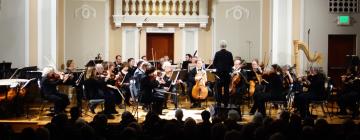Making Summer Top Ten a Baker's Dozen
The effort to select 10 summer music/dance events is daunting, to say the least, when considering such lists as the 400 free summer attractions in the city, so we carry on, adding a few more.
S.F. Ballet in the Grove
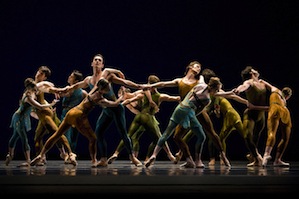
The San Francisco Ballet — whose long performance hiatus stretches from May through the December Nutcracker run — will make just one summer appearance, but it's a doozy. At the free annual summer performance in Stern Grove, the company offers both the best of the past and a bit of a dress rehearsal for the company's upcoming tour of Hamburg, Moscow, etc.
The program includes Wheeldon’s Within the Golden Hour, a pas de deux from Helgi Tomasson's 7 for Eight, Hans van Manen's Solo (a deceptively named piece for three dancers), and George Balanchine's Scotch Symphony.
July 29, 2 p.m., free, Stern Grove, 19th Ave. and Sloat Blvd., S.F. (415) 252-6252, www.sterngrove.org
'Sunday Serenades' in Sausalito
Cellist Sarah Fiene and pianist Daniel Lockert present a five-concert summer series of afternoon chamber music in Sausalito's Christ Episcopal Church, beginning July 1.
"Sunday Serenades" opens with music of Janácek, Messiaen, Schumann, and Piazzola at what aims to be "a relaxing hour of beautiful music for cello and piano, followed by a no-host wine and cheese reception with the artists."
July 1, 4 p.m., Christ Episcopal Church, 70 Santa Rosa Ave., Sausalito. (415) 332-1539, www.christchurchsausalito.com/
Gomyo at S.F. Pops
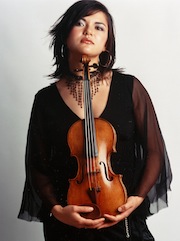
San Francisco Symphony's summer concerts have not been called the Pops officially for years, but oldtimers (and truth-tellers) will persist. Among the more substantial events is the all-Russian program, conducted by Michael Francis, and Karen Gomyo, an emerging international star who made her SFS debut last year, playing the solo in the Tchaikovsky Violin Concerto.
Born in Tokyo, Gomyo grew up in Montreal and New York; she received the prestigious Avery Fisher Career Grant in 2008. The program also includes the Shostakovich Festive Overture, "Polovstian Dances" from Borodin's Prince Igor, and the Tchaikovsky piece no summer concerts can do without, the 1812 Overture — probably not using proper cannons inside Davies Symphony Hall. The summer concerts offer half-price tickets for those under 17.
July 13, 8 p.m., $15-72, Davies Symphony Hall, 201 Van Ness Ave., S.F., (415) 864-6000, www.sfsymphony.org
Hofman Named Diablo Symphony Artistic Director
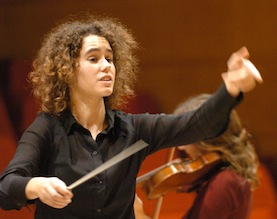 Just in time for Diablo Symphony's 50th anniversary season, Matilda Hofman has been named artistic director and conductor to succeed Joyce Johnson Hamilton, who retired after 30 years on the job.
Just in time for Diablo Symphony's 50th anniversary season, Matilda Hofman has been named artistic director and conductor to succeed Joyce Johnson Hamilton, who retired after 30 years on the job. Hofman, 33, is a lecturer in the UC Davis music department. A native of Oxford, England, Hofman studied at Cambridge University, the Royal Academy of Music and the Eastman School of Music.
Her work as a conductor ranges from opera and symphonic repertoire to contemporary music. In addition to symphony orchestras, Hofman has conducted operas in Europe and was assistant conductor at Sacramento Opera. She is a regular guest conductor of the Empyrean Ensemble at UC Davis and the Bay Area’s Left Coast Chamber Ensemble.
In 2003 Hofman formed the Bay Area-based Kreisler Ensemble, a group seven musicians; she is the conductor and artistic director. She is married to Christian Baldini, a composer and conductor who leads the UC Davis Symphony Orchestra. The couple has two young children.
Fellow UC Davis faculty member Kurt Rohde, told of the appointment by SFCV, said "Wow! This is great news. Matilda is a wonderful musician and person — they are lucky to have her." Rohde, founder of the Left Coast Chamber Ensemble and codirector (with Mika Pelo) of the Empyrean Ensemble, said Hofman is "a vital, important part of our community at the UCD Music Department."
A Pocket Norma
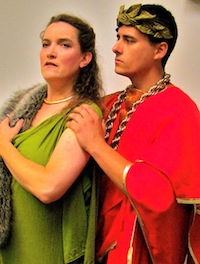 Bellini's Norma, says Pocket Opera's Donald Pippin, who is presenting the big opera with his small company, provides —
Bellini's Norma, says Pocket Opera's Donald Pippin, who is presenting the big opera with his small company, provides — ... the ultimate challenge for a soprano, both vocally and dramatically, in the quintessential bel canto opera of all time with its long, liquid phrases of soaring melody. At first, serene, disciplined, above the fray, warmly compassionate, a revered leader of both men and women in the highly charged atmosphere of a small, occupied country, she is all the while concealing a double life that, if exposed, would lead to devastating consequences.Pippin is assigning this mighty role to Elin Carlson, formerly heard with Pocket Opera in La Rondine, La Traviata, and other roles, is boldly likened by Pippin to Joan Sutherland, no less. Carlson's voice may sound familiar to moviegoers as she was heard in Mulan, The Sixth Sense, and several Danny Elfman movies.When she discovers that her long-time lover (and father of her two small children) for whom she has risked everything is about to abandon her for a younger woman, her life falls apart. She is reduced to utter despair, savage fury, hunger for revenge, and even violence. But after much inner struggle, her transcendent greatness finally prevails.
Kathleen Moss is Adalgisa, Gail Simpson is Clotilde, Robert Vann is Pollione, John Bischoff is Oroveso, and Mark Kratz is Flavio. Says Pippin, confidently: "We promise you a memorable experience — sheer beauty, horror and sublimity."
The Pocket Norma will be performed in two Sunday afternoon performances only, June 24 in the San Francisco Marines Memorial, and July 8, in Berkeley’s Hillside Club.
Musical Farewell to Foie Gras
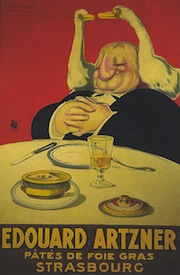 Quirky, imaginative, and peripherally commercial Salle Pianos and Events will bid a musical adieu on June 23 to engorged goose liver pâté, marinated in Cognac and embellished with truffles.
Quirky, imaginative, and peripherally commercial Salle Pianos and Events will bid a musical adieu on June 23 to engorged goose liver pâté, marinated in Cognac and embellished with truffles. "Goodby Foie Gras" is calling attention to the July 1 California ban. On the program: Chopin (Etude Op. 25, No. 1 and 12) and Liszt ("Evening Bells" and Galop de bal, S.220) performed on a Pleyel grand (Paris, circa 1922) by William Kirkpatrick. And, the soon-to-be-illegal pâté, French cheeses, champagne, and more.
Owner/maitre d'hotel Tibor Attila Szabo says there will be also "sweet sauternes wine, traditional with foie gras"; news to non-gourmet moi. He explains the programming: "France and Hungary are the the largest producers so we tried to pair the music with the food."
Thoughtfully, vegetarians are invited to celebrate the law forbidding the sale of "fat liver" with music, cheese, and salad, none of which has animal residue (although I am not sure about the status of cheese). RSVP required to [email protected], and rather than tickets, there are "suggested donations" of $40; $30 for students.
P.S.: At least one source gives counterindication to cheese as vegetarian fare because "Most cheeses contain a coagulant (rennet) that is added to the milk to separate the curds from the whey. Traditional rennet is made from an enzyme found in the stomach lining of suckling calves and lambs." Sigh.
Scheppelmann Moving On
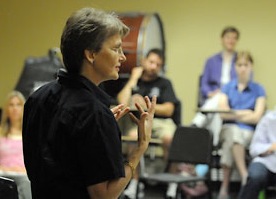 Former San Francisco Opera Artistic Administrator Christina Scheppelmann is leaving Washington National Opera, where she has served as director of artistic operations since 2002. She had primary responsibility for casting and repertoire.
Former San Francisco Opera Artistic Administrator Christina Scheppelmann is leaving Washington National Opera, where she has served as director of artistic operations since 2002. She had primary responsibility for casting and repertoire. When Placido Domingo wrapped his 15-year tenure at WNO as general director last year, and the company merged with Kennedy Center, under the direction of Michael Kaiser, Scheppelmann continued in her post as Michael Mael became executive director, and Francesca Zambello assumed the position of artistic advisor (the title she held in San Francisco as she headed an SFO-WNO co-production of Wagner's Ring).
Now that Zambello is general director of the Glimmerglass Festival, in addition to her work as stage director in many venues, and Scheppelmann is leaving (in November), "there will be some changes made" in Washington, inevitably. Scheppelmann, who is planning the WNO's 2015-2016 complete Ring cycle, and overseeing the American Opera Initiative, will work with another organization next year, but has not provided any information about that so far.
American Opera has selected three mentors — composer Jake Heggie, librettist Mark Campbell, and conductor Anne Manson — to work with young composer-librettist teams. In the first round of the program, three brief new works will be produced. They are The Game of Hearts, about widows in a Seattle nursing home, by Douglas Pew and Dara Weinberg; Part of the Act, set in a vaudeville theater in the 1920s, by Liam Wade and John Grimmett; and Charon, an allegorical piece about the boatman of the Stix, by Scott Perkins and Nat Cassidy.
Varieties of Nixon
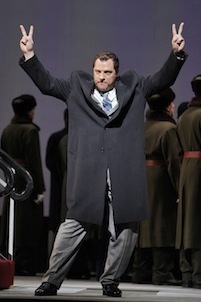 Each performance of a production is different, as a matter of course, but distinctions between San Francisco Opera performances of John Adams' Nixon in China appear even more marked.
Each performance of a production is different, as a matter of course, but distinctions between San Francisco Opera performances of John Adams' Nixon in China appear even more marked. At the Sunday matinee, the biggest (and happy) difference was a full house, with an unusual infusion of young and youngish people, and the kind of vibrant, alive standing room crowd from the days of yore. Ticket discounts — still available — contributed to the good attendance unusual for newfangled operas, but the important thing is to get 'em in the door.
Different too was the atmosphere. Unlike previous instant audience embrace of the first (and best) act, the matinee crowd appeared puzzled, stunned — but not in a bad way. Clearly more show than opera fans, they applauded Erhard Rom's spectacular transformation of Air Force One from video to "real life," but sat in absolute silence in the minutes-long break before the banquet scene; when I finally broke the silence with applause, not many followed, as if in doubt if this was the end of Act 1 of Parsifal, best observed in awed (or incomprehensive) silence.
The entire cast seems to thrive, quite free — or so it seems — from the bugs circulating among the Magic Flute cast, but Brian Mulligan's Nixon, already distinguished at the premiere, keeps towering over all — it's pure pleasure listening to that warm, limpid voice.
Not different, happily so, was the orchestra's grand, unremitting performance under the ever-vigorous baton of Lawrence Renes, and the aural orgy of Ian Robertson's Opera Chorus (ah, the beginning of the opera; ahh, the banquet bacchanalia!).
While the musicians' persistence and endurance deserve kudos, they cannot vie for the marathon crown with Yuja Wang across the street, in Davies Hall, performing her fourth brilliant Rach 3 in four days. How does she do it?! Yuja is gone (resting, I hope), but Nixon is here to stay for a short while: June 22, 26, 30, and July 3 (just in time for another national holiday).
[A footnote: Both the China visit high point of the Nixon presidency and the Watergate break-in, which led eventually to his resignation, took place 40 years ago; the former in February, the latter in June, 1972.]
What Hath J. Adams Brought?
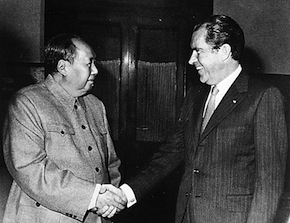 The early John Adams Nixon in China is among his best works, along with Harmonielehre and Harmonium. It's difficult to explain the complexity and richness of these works beyond (or under) the pulsing ostinato, but Cedric Westphal does as good a job of it as I've seen. Here is just a brief excerpt from his Nixon in China review, I recommend reading the entire article.
The early John Adams Nixon in China is among his best works, along with Harmonielehre and Harmonium. It's difficult to explain the complexity and richness of these works beyond (or under) the pulsing ostinato, but Cedric Westphal does as good a job of it as I've seen. Here is just a brief excerpt from his Nixon in China review, I recommend reading the entire article. The music is built atop a backbone of minimalist tropes, mostly arpeggios oscillating between major and minor chord inversions by shifting one note. Say, going G-C-E to C-E-A to hesitate between C major and a minor.Some of it is drone-like and here and there it gets a bit bland. Some of it fits perfectly, as a repeated chromatic oscillation suggests a rainstorm in the most evocative fashion. But mostly, Adams manages to layer this with different textures and colors to add some a surprising expressiveness.
There are musical high points, such as a percussive news aria to open the opera where Nixon gets excited by the global immediacy of the media coverage of his trip; or the famed aria by Mao's wife, where the music takes vividly scary undertones. Adams phrases the libretto using the natural rhythm of the words, in a sophisticated form of Sprechgesang.
...
Adams gets away from the stern minimalism, using a solemn descending chromatic bass line to orchestrate the beating of a Chinese peasant ("This is the fate/of all who set/small against great"). While the score is resolutely innovative and modern, it grows and expands upon traditional musical images.
...
The scene in which the peasant stands up after the rain sounds like a Wagnerian sunrise, so lush and majestic. There is a Rossinian end-of-act drinking song. And Adams self-deprecatingly mocks his own minimalism, with the chorus repeating the word "pig" atop the orchestral drone in Mrs. Nixon's visit to a Chinese farm. Minimalism as comic relief ...
Centennial Bartók Opera in SFS Centennial Season
I am a lonely man. I may have a few friends in Budapest, yet I am absolutely alone ... and this loneliness is to be my destiny. I look about me in search of the ideal companion, and yet I am fully aware that it is a vain quest. Even if I should ever succeed in finding someone, I am sure that I would soon be disappointed.
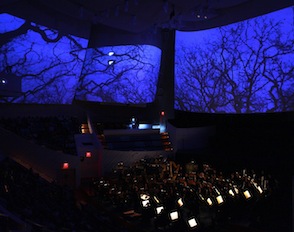 Ordinary men may keep wallowing in such self-pity. The extraordinary Béla Bartók followed this lament in his 20s by creating a masterpiece when he turned 30 about ultimate loneliness. The 1911 Duke Bluebeard's Castle — coming to Davies Hall, June 21-23 — is powerful and memorable, an opera with great drama and deep psychological impact.
Ordinary men may keep wallowing in such self-pity. The extraordinary Béla Bartók followed this lament in his 20s by creating a masterpiece when he turned 30 about ultimate loneliness. The 1911 Duke Bluebeard's Castle — coming to Davies Hall, June 21-23 — is powerful and memorable, an opera with great drama and deep psychological impact. It's century old music that sounds as new, complex, and thrilling as 25-year-old Nixon in China across the street in the Opera House. Bartók employed such simple but then still-innovative touches as the repeated use of the minor second, an interval with dissonance (not nearly as jarring today as it was back then) that evokes sadness and fright in turn. (Stravinsky and Schoenberg were not far behind.)
Says Michael Tilson Thomas, who is responsible for setting up an international consortium — Philharmonia Orchestra, Konzerthaus Dortmund, Gulbenkian Foundation, and his own New World Symphony — to create this production, and who is conducting the San Francisco Symphony:
The way Bartók combines music and drama to create this tense, terrifying, and ultimately thrilling atmosphere is masterful. He uses the orchestra to great effect as a kind of third character, commenting as the story unfolds and more and more of Bluebeard’s secrets are revealed.This production that puts the orchestra center stage with the singers and the visuals seemed like a great fit for our centennial season. We’re not only celebrating our amazing musicians, but we’re also celebrating the year of our founding, 1911. Two of the works getting the interdisciplinary treatment this season — Debussy’s Martyrdom of St. Sebastian, which we staged in January, and now Bluebeard’s Castle — were composed that year.
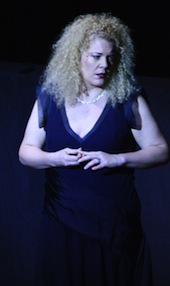 Based on a French fairy tale by Charles Perrault (also the author of Cinderella and Sleeping Beauty), this is no children's story, about a mysterious, somewhat sinister duke who brings his new bride home to his castle. As Judith explores the castle — and Bluebeard — secrets are revealed, creating a fatal web for the young woman who cannot escape from the consequences of knowing too much.
Based on a French fairy tale by Charles Perrault (also the author of Cinderella and Sleeping Beauty), this is no children's story, about a mysterious, somewhat sinister duke who brings his new bride home to his castle. As Judith explores the castle — and Bluebeard — secrets are revealed, creating a fatal web for the young woman who cannot escape from the consequences of knowing too much. The chain of episodes lead from the castle's torture chamber, to the armory, the treasury, garden, a view of Bluebeard's kingdom (with a majestic outburst of music), the pool of tears, and to what's beyond the final door — not to be spoiled here.
Filmmaker Nick Hillel's production uses Adam Wiltshire's dramatic projections surrounding the stage. Staging in San Francisco is by José Maria Condemi, who says of the opera: "It is very much a 'theater of the mind' one and I cannot think of more juicy, interesting material to stage, particularly with the use of these enhanced video projections."
The cast consists of bass Alan Held (Bluebeard) and mezzo Michelle DeYoung (Judith). The first half of the concert is Liszt's Piano Concerto No. 1, with Jeremy Denk as soloist. (Unlike in Miami, where the opera was paired with Bartók's String Quartet No. 6, a far, far more appropriate and meaningful choice.)
San Francisco Arts Town Hall
San Francisco Arts Town Hall 2012 will take place on Aug. 20, at the Yerba Buena Center for the Arts. Among participants will be city government officials and candidates for the San Francisco Board of Supervisors. Sponsoring organizations include California Academy of Sciences, Californians for the Arts, CounterPULSE, Recording Academy San Francisco Chapter, San Francisco Bach Choir, San Francisco Ballet, San Francisco Opera, San Francisco Performances, and many others.Attendance is free, but registration is required.
The Town Hall announcement says over 4 million people participate in the events, programs, and services provided by San Francisco’s arts organizations each year, and more than 5,000 Bay Area residents work at arts organizations every day.
Marin Chamber Music Festival Benefit
Marin, with a history of notable chamber music events, has an ongoing, resurgent festival, under the direction of Sarn Oliver, and it's giving a concert to raise funds for the season. The event is at 3 p.m., June 24, in the Mill Valley Community Center. It features musicians from the San Francisco Symphony along with young musicians from Marin.The Sunday program includes works by Telemann (Canonic Duo), Handel-Halvossohn (Passacaglia), and Ravel (String Quartet in F Major), and an original composition by Oliver (Mozart Haus Haydn), among others. It's an unusual fundraiser with free admission, but donations for the festival will be accepted at the door.
